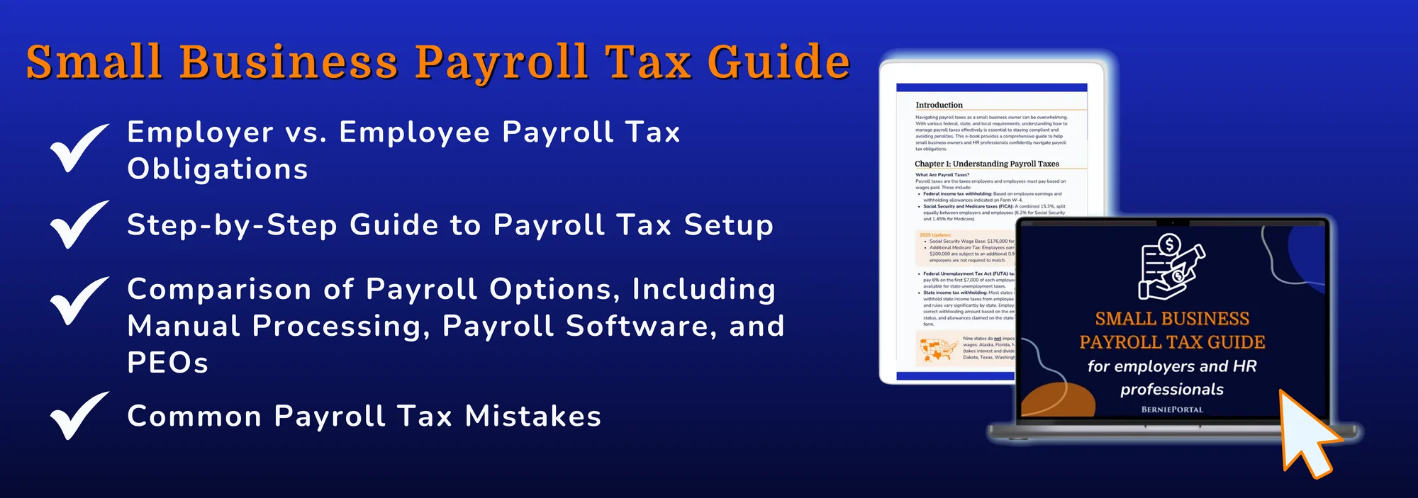
Written by
Callie Horner
Callie is an aPHR-certified writer on the marketing team at BerniePortal. She writes about HR, healthcare, and benefits.
2025 Biweekly Payroll Guide

As we approach 2025, it's essential for HR professionals to plan for the upcoming year's payroll schedule. Understanding the number of pay periods and selecting the appropriate payroll frequency are crucial for budgeting, compliance, and employee satisfaction.
Understanding Pay Periods
A pay period is the recurring time frame during which employees earn wages. Common payroll schedules include:
- Weekly: 52 paychecks per year
- Biweekly: 26 paychecks per year
- Semimonthly: 24 paychecks per year
- Monthly: 12 paychecks per year
Each schedule has its advantages and challenges, affecting cash flow, administrative workload, and employee satisfaction.
Biweekly Pay Periods in 2025
HR pros should expect 26 biweekly pay periods in 2025.
According to the US Bureau of Labor Statistics, "biweekly" pay is considered the most popular pay frequency in the United States. Its popularity is due to consistent paydays and simplified overtime calculations.
Depending on your organization's payroll start date, certain months will feature three pay periods in 2025:
- First paycheck on January 3, 2025: Employees will receive three paychecks in January and August.
- First paycheck on January 10, 2025: Employees will receive three paychecks in May and October.
How to Handle Payroll Deductions During Extra Pay Periods
Managing payroll deductions in months with three pay periods can be a challenge, but careful planning ensures a smooth process. For biweekly payroll, many employers opt for one of two approaches.
The first method is to divide the employee’s annual benefit costs (such as health insurance premiums) by 26, ensuring equal deductions from every paycheck throughout the year.
Alternatively, some employers divide monthly premiums in half and deduct them from two paychecks each month, skipping deductions on the third paycheck in months with three pay periods. This method gives employees a “deduction-free” paycheck twice a year, which they often appreciate.
Regardless of the approach you choose, clear communication is critical—ensure employees understand how deductions work, especially during those months with an extra paycheck. Automating deductions through payroll software can also reduce errors and make administration easier.
Implementing the right technology is essential for simplifying the complexities of biweekly payroll. With BerniePortal, HR teams can automate calculations for overtime and deductions, seamlessly handle months with extra pay periods, and provide employees with accessible pay stubs and year-to-date records.
Choosing the Right Payroll Schedule
Selecting the optimal payroll schedule depends on various factors:
- Employee Classification: Non-exempt employees may prefer more frequent paychecks, while exempt employees might be comfortable with less frequent schedules.
- Administrative Resources: More frequent pay periods require increased administrative effort and resources.
- Compliance Requirements: Ensure adherence to federal and state regulations regarding pay frequency.
Additional Resources
You can stay informed, educated, and up to date with important HR topics using BerniePortal’s comprehensive resources:
- BernieU—free online HR courses, approved for SHRM and HRCI recertification credit
- BerniePortal Blog—a one-stop shop for HR industry news
- HR Glossary—featuring the most common HR terms, acronyms, and compliance
- Resource Library—essential guides covering a comprehensive list of HR topics
- HR Party of One—our popular YouTube series and podcast, covering emerging HR trends and enduring HR topics
- Community—the HR Party of One Community forum, a place devoted to HR professionals to ask questions, learn more, and help others

Written by
Callie Horner
Callie is an aPHR-certified writer on the marketing team at BerniePortal. She writes about HR, healthcare, and benefits.
Related Posts
Each year, new state and local regulations take effect, and with a new administration...
From major holidays to key compliance and ACA deadlines, here’s everything you need to...








Submit a Comment